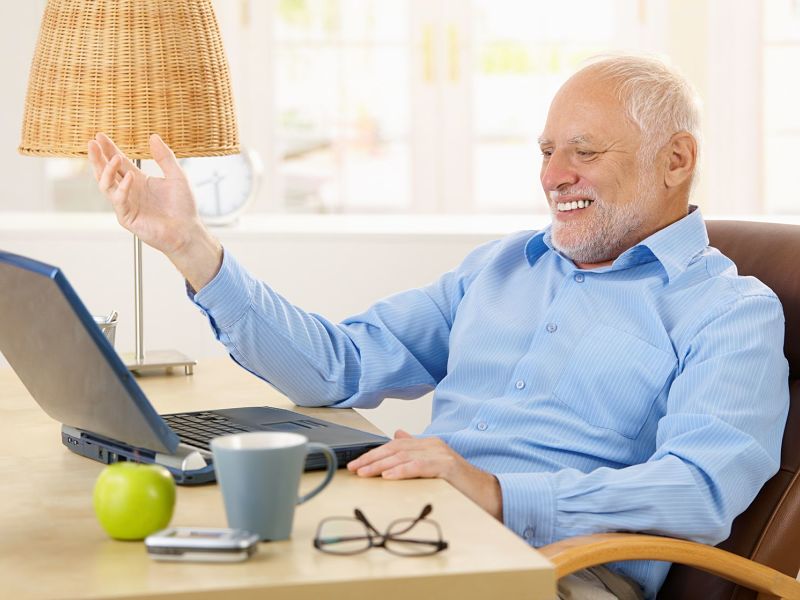
As the baby boomer generation retires, many financial advisors will find these clients reaching a major life transition. They will be thinking about the best way to stay up to date and in touch as easily as possible, which means that computing should be a part of their lives.
Computers enable your clients to read about financial information online, manage taxes and even talk to you and family members remotely. Many seniors want a quick and easy solution without complex distractions.
– Tablet or computer?
The first consideration for seniors is the computing format. When choosing among tablet, laptop and desktop, retirees must take several things into account. Location and activity are most important. Seniors who plan to vacation frequently will want a portable device. Clients who anticipate reading a lot of books or magazines while relaxing on the couch may narrow their choice further to a tablet.
Another consideration is accessibility. The smaller the device, the harder it is to peck out characters on the keyboard and read text on the screen. Apple Inc.’s iPad (which was updated with new Pro versions of the device in late October) includes visual accessibility features for zooming and magnifying text, as well as for reading it aloud.
– Laptops
Seniors wanting the keyboard experience and portability may opt for a laptop. Microsoft Corp.’s Windows and Apple’s Mac options are the most common platforms. Neither of these companies’ operating systems (OS) is particularly friendly for seniors. Windows 10 has a “tablet” mode at least, which offers a full-screen Start menu to which users can “pin” frequently used applications. And macOS has its Launchpad, which displays an array of applications that can be launched with a single click.
Both OSes still take some interface tweaks and file configurations to remove many of the distractions built into the interfaces. These OSes also rely heavily on desktop software, which must be installed, managed and updated.
As an alternative, don’t overlook Chrome OS from Alphabet Inc., which owns Google. This OS puts the web front and centre. Instead of installing applications on the desktop, users can rely entirely on web apps, including Google’s extensive array, while Skype (a popular application for connecting with faraway grandchildren) is available in web form. More recent versions of Chrome OS can run Android (mobile) applications if elderly clients really need them.
Chrome OS is available on Chromebooks, which are lightweight laptops. Many of these now double as tablets, thanks to their hybrid, fold-back screens, which give seniors the best of both worlds.
Google’s Pixelbook (which has a 12.3-inch fold-back screen) and Pixel Slate (which has a detachable screen) are good examples.
– Desktop computers
Some seniors may prefer to do all their computing at a desk rather than on the sofa. These clients may also want a bigger screen and keyboard for greater visibility and better functionality.
Although Windows and macOS certainly are good options, Chrome OS also is available on a desktop unit known as the Chromebox. This device, available from various manufacturers, is small and needs less computing power than most Windows and macOS desktops. In addition, Chromebox often is less expensive than its PC counterparts.
Optional accessories for older users include specialty keyboards. The EZSee large-print keyboard from Ergoguys LLC features large, high-contrast black letters on yellow keys that make seeing them and typing easier. An alternative is Aluratek Inc.’s large-print, tricolour, illuminated keyboard, on which the keys light up in one of three colours, enabling seniors to see the keys more easily.
In addition, you may want to recommend a touch-display monitor to make interacting with the computer simpler still.
Many modern laptops come with touch-screen functionality built in. All-in-one Chromeboxes and desktop Windows PCs are available with touch-screen interfaces. The only holdout is Apple, which refuses to produce a touch-screen laptop or desktop for fear of cannibalizing iPad sales.
There also is a category of computer that may be ideal for seniors with little computing experience or tolerance for tech gadgetry. Specialist computing devices for seniors are rare, but may be worth a look. Venture 3 Systems LLC’s range of senior-friendly Telikin computers feature a locked-down Linux OS that doesn’t permit the installation of custom applications.
Instead, these touch-screen units start up with a default visual interface providing easy access to applications such as Skype, photos, calendar, contacts, weather, news, web browsing and casual games. Venture 3 ships to Canada for a small fee and also offers a 60-day trial period.